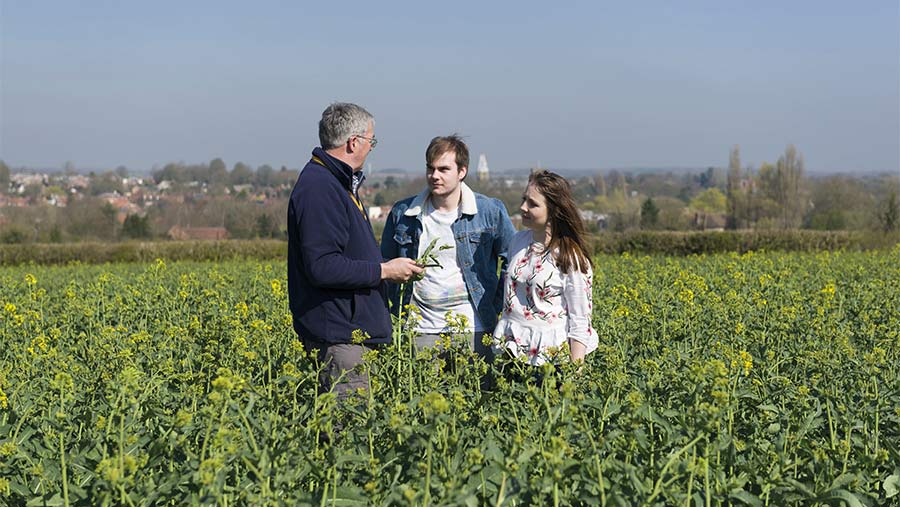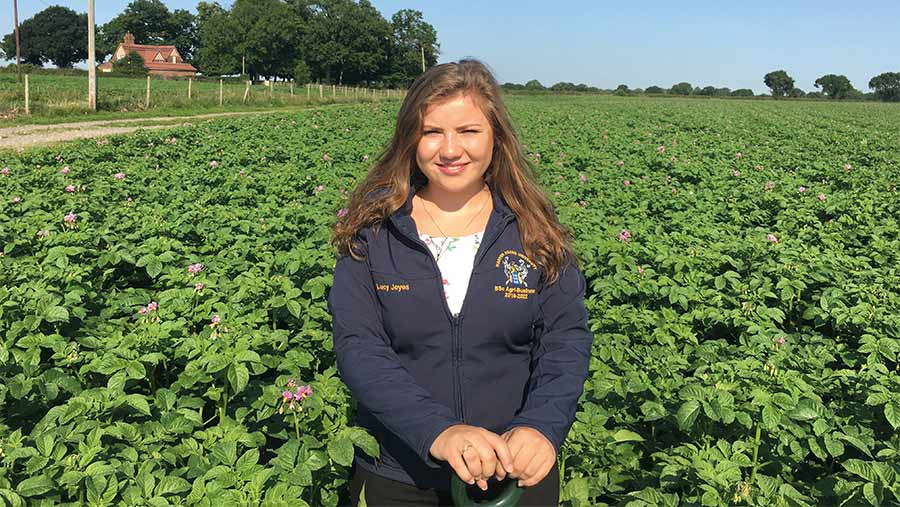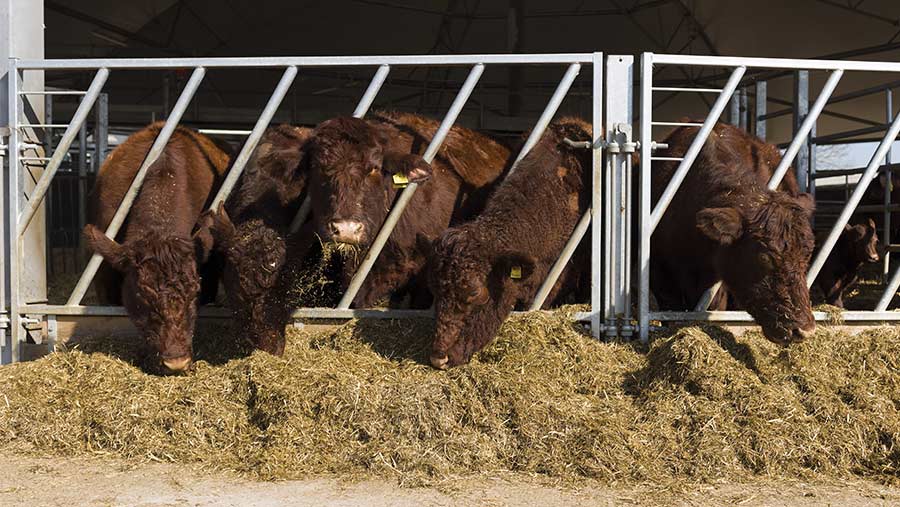Coronavirus: How ag studies will restart in September
 Social distancing will change how students are taught © Nottingham Trent University
Social distancing will change how students are taught © Nottingham Trent University Education leaders are having to adapt to changing government advice as they try to plan the teaching of thousands of new and returning students come September.
Despite all the uncertainty and disruption caused by the pandemic, the farming industry has been working hard to help feed the nation.
Many students studying agriculture and land-based subjects have already started work on farms over the summer, helping out with harvest and livestock, before returning to their studies in September.
See also: How ag students are adapting to ‘new normal’ of Covid-19
Agriculture universities and colleges are therefore already drawing up teaching plans that follow government guidelines, while causing as little disruption as possible for students and staff.
There will be a greater reliance on digital teaching, using platforms such as Microsoft Teams. Most institutions say they will try to offer as much practical, face-to-face teaching as possible, though social distancing is still likely to play a part.
Universities
Harper Adams University in Shropshire moved all of its teaching online for the rest of the 2019/2020 academic year when the lockdown began in March.
It plans to be open for new students in late September, and for returning students at the start of the autumn term in early October.
Vice-chancellor Dr David Llewellyn said the university is working on ways to provide courses should Covid-19 measures remain in place, or if there are further government restrictions needed at any point.
“These methods are likely to include teaching in small groups where social distancing can be safely applied and the use of online resources and blended teaching, where some provision, primarily large classes, may be online.
“The changing nature of the Covid-19 pandemic means that we also have to respond to the latest guidelines,” he said.
Student view
Lucy Jeyes has already started her placement year at potato marketing company 3 Shires Ltd, as part of her Agri-Business degree at Harper Adams University. Towards the end of her second year she used Microsoft Teams for virtual lectures, something her peers will be doing more of come September.
“These were very easy to access, but it does not meet the same level of interaction as face-to-face learning,” she said. “Being at university sets a working environment which puts you in a better frame of mind, making it is easier to focus and to work more efficiently.”
The 20-year-old, who grew up on a livestock farm in Warwickshire, says she is lucky to have secured her placement amid the pandemic. “Companies are not looking to put on extra staff in these unforeseen circumstances, making it harder for students to find placements which is crucial for the completion of their degree,” she said.

The Royal Agricultural University in Cirencester, Gloucestershire, says it plans to re-open its campus in September, with appropriate social distancing measures in place.
This includes the library, study areas, catering outlets and sports areas.
Lectures will be delivered online, but all students will also have face-to-face teaching through seminars, tutorials and practical sessions in smaller groups.
Nottingham Trent University’s (NTU) Brackenhurst Campus is home to the School of Animal, Rural and Environment Sciences (ARES), where agriculture and other land-based courses are taught.
Prof Robert Mortimer, dean of ARES, says the campus will be open for the new academic year and is planning for a blend of on-campus teaching and online learning, with face-to-face teaching initially reserved for the practical elements of courses until government guidelines change.
“All of the courses we run at Brackenhurst are highly practical, with elements of fieldwork, laboratory work, animal handling and other outdoor activities.
“We expect to run as much of this practical activity face-to-face as possible, with modifications to ensure safe working. We are lucky that we have such an extensive ‘outdoor classroom’, with 200ha of farm and estate land across which we can teach.”
Additional handwashing and hand sanitisation facilities will be available on the campus and NTU says it expects to be able to welcome first-year students to their halls of residence.

Lincolnshire Reds at Nottingham Trent University’s Brackenhurst campus
Reading University will continue to use “flipped learning” for its students where appropriate, as Simon Mortimer, head of the school of agriculture, policy and development, explains.
“Our first year introduction to crop production is taught using this approach, with students engaging with pre-session material such as lecture videos or podcasts and other types of background reading material.
“Students then bring their pre-learning with them to an interactive session, working in teams to deepen their understanding through discussion and team activities, guided by academic staff.
“We have a number of practical elements in our courses including farm visits and residential courses.
“If allowed, within the current government guidelines, we plan to run these. We are lucky to have a range of in-house sites and facilities including our commercial dairy farm, centre for dairy research and extensive crop facilities.”
Scotland’s Rural College (SRUC) says its new academic year will begin on 28 September, with a virtual welcome week for new students beginning on 21 September.
The plan is for lectures and seminars in courses such as agriculture, engineering, horticulture, vet nursing and animal care to be taught online, as far as possible, for the first semester.
Coupled with smaller class sizes, SRUC says the new arrangements will mean it can adapt to changes in social distancing guidance and ensure the best possible experience for students should restrictions come back into effect in the future.
Prof Wayne Powell, principal and chief executive of SRUC, says: “Fortunately, we were already looking to the future by introducing more blended – online and face-to-face – ways of teaching and learning.
“Under this new approach, students are equal partners in SRUC, and we will empower our students to have more choice in how they learn.”
Colleges
In Northern Ireland, the College of Agriculture, Food and Rural Enterprise (Cafre) plans to offer as much face-to-face teaching as space allows while ensuring social distancing guidelines are followed.
NI farm minister Edwin Poots says where this is not possible, the college will provide remote learning using platforms such as Microsoft Teams.
“This has already proved very successful when introduced for students during the last academic year. Practical learning is the unique feature of all our programmes at Greenmount, Loughry and Enniskillen campuses.
“Cafre will therefore continue to provide students with practical learning opportunities in line with the social distancing guidelines in place at that time.
“Likewise teaching facilities, student accommodation, dining rooms and libraries will be available whilst following the prevailing Public Health Agency guidance.”
Plumpton College in East Sussex has created a “Coronavirus Declaration” that students and staff will follow when the new academic year begins in September.
Anyone on campus will be expected to adhere to a series of measures. These include a one-way system and new classroom layouts to ensure social distancing can be observed.
Students will have to use their own laptops, to remove the risk that shared computers present in the circumstances. The college says it will provide laptops to students who do not have access to their own.
College principal Jeremy Kerswell says the measures will be under constant review and will be in line with the latest government guidance.
Bridgend College in Wales began the phased reopening of its campuses on 15 June, but only for small groups of students who need to undertake assessments to complete their qualification.
The college is planning teaching for September and expects delivery to be a blend of online learning and small group access to practical workshops during the first term. Students will be contacted when plans have been finalised.
Myerscough College in Lancashire offers diplomas in agriculture, as well as degree-level study. In a letter to students, the college says it plans to open its campuses for the start of the new academic year, with protective measures in place.
Teaching arrangements are expected to comprise a blend of some larger group sessions and lectures delivered online, with small group classes, tutorials and practical sessions delivered face-to-face in suitably spaced classrooms.
Askham Bryan College in York says it is planning its return to a “new normal”. Campuses will open in September in line with government guidelines, including social distancing measures.
Chloe Rendall, interim assistant principal, says the pandemic has been the biggest challenge staff have ever faced at the college.
“From being land-based specialists using our fantastic environmental resources, we suddenly have to become IT savvy specialists who had to teach and assess agriculture and practice.
“It is challenging but we are ready to welcome back our students and staff and ensure that we continue to deliver high-quality teaching and learning.”
Updates and changes
This report is a snapshot of what some of the leading universities and colleges are planning for the next academic year. Academic institutions will be in contact with students to keep them updated on their teaching and accommodation plans. Students should contact their institution directly if they have any questions.
Any other agricultural universities and colleges that would like to share their teaching plans for the new academic year, in light of the coronavirus, can email ed.henderson@markallengroup.com. Information can be added to this story as it becomes available.
